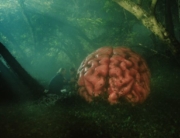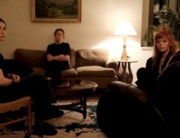Fasten your seat belts, My Big Night is going to be a bumpy one. One of Spain’s masters of comedy noir, Álex de la Iglesia, is back with a rollicking farce about the production of a New Year’s Eve television special—in mid-October, nonetheless—that must go on no matter what the human cost.
Hundreds of laid-off workers strike outside, facing security forces that have turned the perimeter of the studio into a veritable military zone. Inside, an abused son plots the assassination of his father, international pop music icon Alphonso, brilliantly portrayed by real-life star Raphael. The latter machinates relentlessly to preserve his status as the headliner of the evening, while other performers are embroiled in plots to secure a spot on the next season of Survivor, to steal celebrity semen for the purposes of blackmail, or to survive the company of a beautiful woman whose bad luck is lethal for those close to her.
Big musical numbers, including a climactic performance by Raphael, drive the rhythm of the entire picture. The uptempo pop music and the actors maintain the high energy level, as do the TV extras who perform on cue compulsory jubilation during the taping of the countdown. The madcap pace and absurd action require a commitment to abandoning convention and reason on the part of the viewer.
That is not to say that My Big Night lacks cohesive storytelling. On the contrary, de la Iglesia is an adept manager of narrative economy, unfurling several threads among the chaos of the film’s opening and tying them up by its end. There is method to this madness. And one finds the director’s characteristic biting social critique running underneath all of the crazy fun, as well. How frighteningly relevant, after all, is his depiction of a raucous media fabrication of a celebration of a new year inside the studio, while outside its walls, the masses battle for their jobs. With youth unemployment at 45 percent in Spain this year, the allegorical suggestions arising from the portrayal of a production company executing massive layoffs and dismissals while manufacturing entertainment cannot be overlooked. Nor can the cringe-worthy plausibility of narcissistic performers vying for their own reality TV show and snapping selfies in front of scenes of gruesome tragedy, more concerned about their Wi-Fi signal than the fate of their colleagues outside.
And therein lies the distinctively Spanish dimension of de la Iglesia’s noir comedic sensibility, a form of what is called esperpento. It consists in taking reality and distorting it, drawing dark, humorous, and critical undertones from an absurd rendering of real life. My Big Night departs from his most recent Witching & Bitching (2013), which staged the battle of the sexes in a fantastical setting, and harkens back to Common Wealth (2000) and The Ferpect Crime (2004). Its distortion of the relatively banal time and space of the New Year’s Eve party parallels the deconstruction of apartment building culture and department stores enacted by the latter films. It also evokes As Luck Would Have It (2011) in its thrusting of a regular, unemployed man into a ridiculous life-threatening situation.
These earlier films, however, allow us the pleasure of being introduced to a credible and mundane—if somewhat eccentric—milieu, only to see it distorted to absurd and dark ends through esperpento. What is thrilling about them is precisely that they provide an encounter with the familiar and its sudden, rapid, and brutal estrangement, which crescendos into delirious action. This grasp of tempo was similarly wielded to great effect in Damián Szifrón’s Wild Tales (2014), which opened the Miami Film Festival last year, just as My Big Night did last month.
My Big Night follows the risky lead of de la Iglesia’s Witching & Bitching and The Last Circus (2010) in playing out its scenario to the absurd maximum from its first instance. But the ensuing rapid pace is difficult to sustain throughout the course of the entire film, even if this one stands out among the recent three. De la Iglesia fans, especially those who also enjoy music videos, should still enjoy the feature, as will anyone who appreciates a deft critique of popular culture articulated in its own idiom.







Leave A Comment